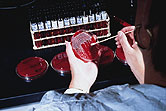
MONDAY, June 10 (HealthDay News) — Low blood sugar in older adults with type 2 diabetes may increase their risk of dementia, a new study suggests.
While it’s important for diabetics to control blood sugar levels, that control “shouldn’t be so aggressive that you get hypoglycemia,” said study author Dr. Kristine Yaffe, a professor of psychiatry, neurology and epidemiology at the University of California, San Francisco.
The study of nearly 800 people, published online June 10 in JAMA Internal Medicine, found that people with episodes of significant hypoglycemia — low blood sugar — had twice the chance of developing dementia, Yaffe said. Conversely, “if you had dementia you were also at a greater risk of getting hypoglycemic, compared with people with diabetes who didn’t have dementia,” she said.
People with type 2 diabetes, by far the most common form of the disease, either don’t make or don’t properly use the hormone insulin. Without insulin, which the body needs to convert food into fuel, blood sugar rises to dangerously high levels. Over time, this leads to serious health problems, which is why diabetes treatment focuses on lowering blood sugar. But sometimes blood sugar drops to abnormally low levels, which is known as hypoglycemia.
Exactly why hypoglycemia may increase the risk for dementia isn’t known, Yaffe said. Hypoglycemia may reduce the brain’s supply of sugar to a point that causes some brain damage, Yaffe said. “That’s the most likely explanation,” she added.
Moreover, someone with diabetes who has thinking and memory problems is at particularly high risk of developing hypoglycemia, she said, possibly because they can’t manage their medications well or perhaps because the brain isn’t able to monitor sugar levels.
Whether preventing diabetes in the first place reduces the risk for dementia isn’t clear, although it’s a “very hot area” of research, Yaffe said.
But the findings do suggest that patients’ mental status needs to be considered in the management of diabetes, Yaffe said.
Other experts agreed.
“This does raise concern about low blood sugar causing future problems with dementia and dementia causing problems with low blood sugar,” said Dr. Stuart Weinerman, an endocrinologist at North Shore-LIJ in Great Neck, N.Y.
Weinerman isn’t convinced that the association between hypoglycemia and dementia is cause-and-effect, however. “This is not a definitive study. It raises questions, but it doesn’t answer them,” he added.
But hypoglycemia is a serious problem for diabetics, Weinerman said. “Sooner or later, everyone is going to have some hypoglycemia,” he said.
Episodes of hypoglycemia increase with age, perhaps because of changes in kidney function and drug metabolism, according to an accompanying journal commentary.
Anyone taking drugs that lower blood sugar should be aware of the signs of hypoglycemia, and be prepared to deal with it, Weinerman said. Symptoms can include confusion, jitteriness, fainting, heart palpitations and blurred vision.
For the study, Yaffe’s team collected data on 783 diabetic patients who were aged 70 to 79 and free of dementia at the start of the study in 1997.
Over 12 years of follow-up on average, participants were periodically given tests of mental ability.
The researchers found people who were hospitalized for severe hypoglycemia had twice the risk of developing dementia compared with those who didn’t have bouts of hypoglycemia.
And patients with dementia were also more than twice as likely to have severe hypoglycemia, they found.
Based on the findings, Dr. Marc Gordon, chief of neurology at Zucker Hillside Hospital in Glen Oaks, N.Y., said he thinks trying to control blood sugar too aggressively might be ill-advised.
“There has been a concern about the association between diabetes and dementia, Gordon said. “Patients need to be careful that they are not either undertreated or over treated and that they monitor their blood sugar,” he said.
More information
For more on hypoglycemia, visit the American Diabetes Association.

